Health center in Villamarchante
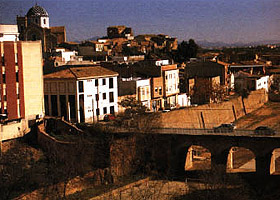
Arquitectos/Architects:
Juan Deltell y Francisco J. Nieto.
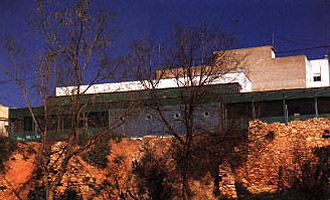
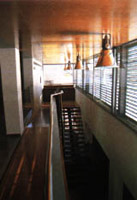
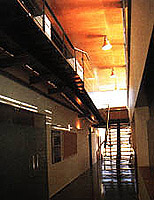
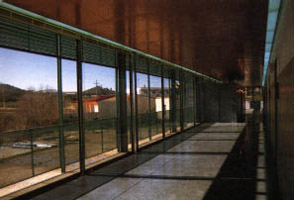
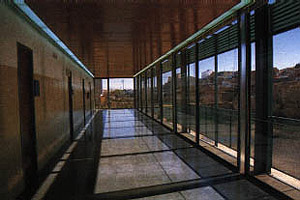
| Centro
de salud en Villamarchante Health center in Villamarchante |
||||||
 |
Arquitectos/Architects: Juan Deltell y Francisco J. Nieto. |
 |
 |
 |
 |
 |
| Tuvimos
la oportunidad de construir junto al barranco de Teula, borde natural que pone límite por
el sur a la población de Villamarchante. Nos encontrábamos ciertamente ante un lugar
malogrado: el perfil de las edificaciones existentes que acogería meses después el
edificio a proyectar, era difuso y agresivo - seguramente nadie desde tiempo atrás se
había preocupado de la manera en que la ciudad deseaba aproximarse al paisaje, a pesar de
existir algunos antiguos datos cercanos, modestos pero elocuentes, que abrigan la clave -,
resultado de la escala excesiva de las construcciones más recientes, a lo que se unía la
ausencia de una fachada que caracterizará y dotará de final al conjunto edificado que
recae sobre el margen urbano del barranco. Así pues, proyectamos un edificio que diera respuesta a estas carencias, conscientes de que nuestra intervención representaría tan sólo un instante en el aglomerado de actuaciones que se suceden en todo lugar, con vocación casi didáctica, de mostrar con humildad un modo posible de enfrentarse en lo sucesivo a esta suerte de envites, por si las operaciones de borde pendientes en el municipio todavía fueran susceptibles de acometerse en este sentido. Acomodamos el Centro en la parte más elevada de la parcela, paralelamente a la medianera de los edificios lindantes, para no alterar la continuidad del tejido y también disponer así de una longitud suficiente sobre la que desarrollar la edificación. Descompusimos el volumen en tres paralelepípedos de alturas y longitudes variables, ordenándolos en escala decreciente en dirección al pretil del barranco, en cascada, como si se trataran de bancales que aterrazaran el perfil urbano, hasta encontrarse con un plano horizontal -aún hoy por construir-, extendido hasta el borde natural, que imaginábamos que resolvería el apoyo del edificio y su entrega con el paisaje. Esta primera decisión ya contenía el resto de determinaciones que conformarían la construcción final. Un cuerpo de dos plantas más opaco, tratado como un volumen compacto, el cerramiento de acusado espesor, perforado estrictamente, sería el encargado de capturar la presencia y la manera de hacer de las modestas construcciones vecinas. Le seguirían otras piezas, articuladas con esta primera y entre sí, en las que la idea de caja iría disolviéndose paulatinamente, para terminar en un elemento liviano, a modo de pabellón, orientando hacia el mediodía, asomando al único paisaje disponible. A esta disposición, se someterían tanto la disección del programa como el sistema estructural elegido y la sintaxis de los diversos elementos componentes o la manera de capturar y tamizar la luz. En definitiva, un ejercicio disciplinado, con los excesos y carencia propios de una obra primeriza, que abundaba en la búsqueda de la coherencia interna de los construido y la nuestra propia. |
The
building was to be sited next to the Teula gully, a natural barrier which constitutes the
southern edge of the twon of Villamarchante. The site was certainly unappetising: the
skyline of the existing buildings, which some months later would include the building to
be designed, was diffuse and agressive as a result of the excessive scale of the more
recent buildings. It was obvious that for a long time nobody had given a thought to how
the town wanted to approach its surroundings, in spite of a few modest but eloquent old
buildings nearby which hold the key. Add to this the absence of a façade which might five
some overall character and meaning to the ensemble of building along the town side of the
gully. We designed a building which would address these shortcomings, although we were aware that our contribution would be nothing more than a passing moment in the continuous succesion of actions which crowd in on each other in any place. Our attitude was almost educational. Humbly, we hoped to indicate a possible way to undertaker this type of challenge in future, in case it might be possible to approach any impending development on the edge of twon along these lines. We placed the Centre at the highest point of the site, in line with the party walls of the adjoining buildings in order to preserve the continuity of the fabric and also to achieve sufficient length in which the building could be developed. We broke the volume up into three parallelepiped of varying heights and lengths, arranged on a decreasing scale in the direction of the edge of the guly, in a cascade, as though they were terracing the town profile down to a horizontal plane (still to be built) which reaches as far as the natural edge. We thought that this way we would solve the question of how to support the building and at the same time open it out towards the countryside. This first decision already contained the subsequent choices which give shape to the final construction. A more opaque main block on two level, treated as one compact volume, and the very thick outer walls with a bare minimun of opening, were intented to capture the presence and the way of doing things of the modest constructions nearly. Other volumes followed, joined to the first and to each other, gradually breaking down the box concept until it dissolved in an airy element, a kind of pavilion facing south over the only scenery available. Whether it be the analysis of the brief, the choice of structural system, the syntax of the various components, or the form of capturing and sifting the light, everything was subordinated to this arrangement. In a word, it was a disciplined exercise, with the natural excesses and faults of an early work, and an insistent search for internal coherence, both that of building and our own. |
|
|
|
|
|
|
Planta baja / Ground floor plan |